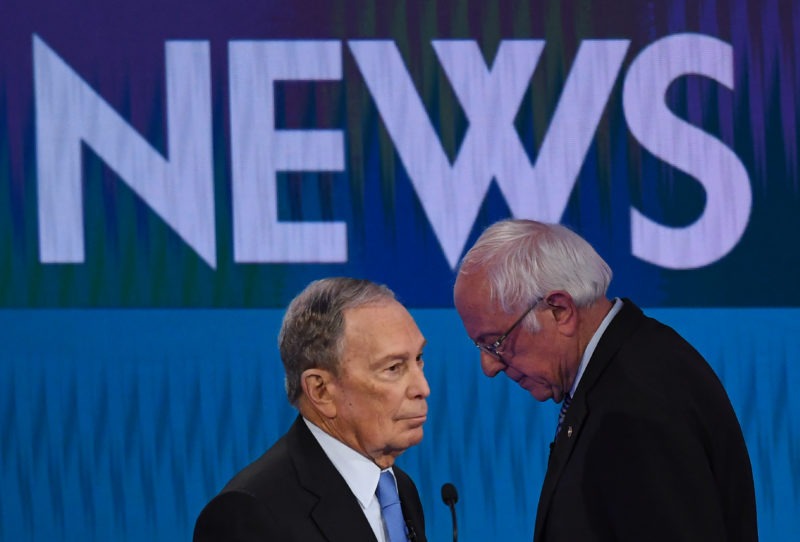A Jewish president? Sanders, Bloomberg vie to bust US barrier
Democratic frontrunner Bernie Sanders (R) and former New York mayor Michael Bloomberg (L), both Jewish, are vying for the party’s presidential nomination (Mark RALSTON)
Washington (AFP) – White House hopefuls Bernie Sanders and Michael Bloomberg could hardly be more different in their politics, but in one striking way they share a similarity marking a milestone in US presidential campaigning: both men are Jewish.
Should Senator Sanders, the progressive torchbearer and current Democratic frontrunner, or centrist billionaire Bloomberg, who is polling in third, win the nomination and then the election against incumbent Donald Trump, America would have the first Jewish president in its history.
The contest may have reached a peak Jewish cultural moment at a recent Democratic debate when Sanders and Bloomberg, both 78-year-olds either born or living in New York, compared their heart health on stage.
And yet the fact that two Jews are in prominent positions in the 2020 race — 16 months after a white nationalist murdered 11 worshippers at a Pittsburgh synagogue — has been met with muted celebration within the Jewish community, and a sense of detachment among the broader public, observed Rabbi Adam Kligfeld.
“It’s amazing, stunning, surprising and odd how little is being made of that data point,” Kligfeld, senior rabbi at Temple Beth Am in Los Angeles, told AFP.
“Maybe that’s a good sign.”
The two are also drawing concerns. Sanders is a self-described democratic socialist, while Bloomberg is a multi-billionaire accused of buying his way into the presidential race.
There is little love lost between them, as evidenced in January when Bloomberg sand-bagged his fellow member of the tribe during an address at a Miami synagogue.
“I know I’m not the only Jewish candidate running for president,” the media tycoon said, between quoting Leviticus and jokes about Wolfie’s deli.
“But I am the only one who doesn’t want to turn America into a kibbutz.”
The rise of Sanders has sparked a debate about whether values embraced by Jews, like social justice, are best achieved through policies including universal health care, or by unwavering defense of Israel.
Sanders antagonized many in the community Sunday by announcing he was boycotting the upcoming annual meeting of AIPAC, Washington’s influential pro-Israel lobby, because it provides a platform for “bigotry.”
Sanders has repeatedly insisted he supports Israel but opposes policies that he says hurt Palestinians. In Tuesday’s debate he branded Prime Minister Benjamin Netanyahu a “reactionary racist.”
Sanders’s dominance in the race has been a point of pride for some Jews, but anxiety for others.
“Sanders is a harder person to cheer for than what the centrist Jewish community fantasized would be the first time they had the chance to consider a Jewish candidate,” Kligfeld said.
– ‘Proud’ Jewish identity –
For several decades Jews have voted overwhelmingly Democratic.
More than two-thirds of American Jews oppose Trump, despite his proclamations that he is Israel’s most ardent defender, according to pollster Gallup.
But only 11 percent of Jewish voters support Sanders for president, while eight percent back Bloomberg, Pew Research Center polling from January shows.
Kligfeld noted how much less of a focus their faith is compared to 20 years ago, when Democratic moderate Joe Lieberman, an Orthodox Jew, was the vice presidential nominee.
Al Gore’s running mate stirred a spirited debate about Judaism and the White House, notably about how Lieberman could serve as vice president if he observed the Sabbath rule barring work from sunset Friday to sunset Saturday.
That Sanders and Bloomberg are less observant than Lieberman may have assuaged similar concerns.
With Trump accused of stoking flames of a culture war, and amid a wave of anti-Semitic violence and other hatred, the success of Sanders and Bloomberg is notable.
“It’s definitely significant (that) two very different politicians but both of Jewish heritage and proud of their Jewish identity can be in such a prominent national political position,” said Logan Bayroff, director of communications for J Street.
The progressive pro-Israel group does not endorse candidates but has said it will support the Democratic nominee against Trump.
Many policies of Sanders and other Democratic candidates “line up with our views and the views of the majority of American Jews,” Bayroff said.
In his first presidential campaign, in 2016, Sanders largely avoided discussing his Jewishness.
He has been more open about his identity this cycle. In December he used a blowtorch to light a Hanukkah menorah in Iowa, where he recalled how his father emigrated from Poland to flee anti-Semitic attacks.
In November he wrote an essay in Jewish Currents magazine in which he said several relatives were “murdered by the Nazis.”
Disclaimer: Validity of the above story is for 7 Days from original date of publishing. Source: AFP.


